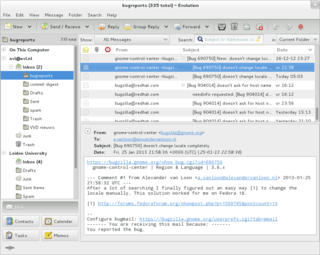Related Research Articles

Electronic mail is a method of transmitting and receiving messages using electronic devices. It was conceived in the late–20th century as the digital version of, or counterpart to, mail. Email is a ubiquitous and very widely used communication medium; in current use, an email address is often treated as a basic and necessary part of many processes in business, commerce, government, education, entertainment, and other spheres of daily life in most countries.

Spamming is the use of messaging systems to send multiple unsolicited messages (spam) to large numbers of recipients for the purpose of commercial advertising, non-commercial proselytizing, or any prohibited purpose, or simply repeatedly sending the same message to the same user. While the most widely recognized form of spam is email spam, the term is applied to similar abuses in other media: instant messaging spam, Usenet newsgroup spam, Web search engine spam, spam in blogs, wiki spam, online classified ads spam, mobile phone messaging spam, Internet forum spam, junk fax transmissions, social spam, spam mobile apps, television advertising and file sharing spam. It is named after Spam, a luncheon meat, by way of a Monty Python sketch about a restaurant that has Spam in almost every dish in which Vikings annoyingly sing "Spam" repeatedly.
LiveJournal, stylised as LiVEJOURNAL, is a Russian-owned social networking service where users can keep a blog, journal, or diary. American programmer Brad Fitzpatrick started LiveJournal on April 15, 1999, as a way of keeping his high school friends updated on his activities. In January 2005, American blogging software company Six Apart purchased Danga Interactive, the company that operated LiveJournal, from Fitzpatrick.

Drupal is a free and open-source web content management system (CMS) written in PHP and distributed under the GNU General Public License. Drupal provides an open-source back-end framework for at least 14% of the top 10,000 websites worldwide and 1.2% of the top 10 million websites—ranging from personal blogs to corporate, political, and government sites. Drupal can also be used for knowledge management and for business collaboration.

An Internet forum, or message board, is an online discussion site where people can hold conversations in the form of posted messages. They differ from chat rooms in that messages are often longer than one line of text, and are at least temporarily archived. Also, depending on the access level of a user or the forum set-up, a posted message might need to be approved by a moderator before it becomes publicly visible.

Email spam, also referred to as junk email, spam mail, or simply spam, is unsolicited messages sent in bulk by email (spamming). The name comes from a Monty Python sketch in which the name of the canned pork product Spam is ubiquitous, unavoidable, and repetitive. Email spam has steadily grown since the early 1990s, and by 2014 was estimated to account for around 90% of total email traffic.

Yahoo! Mail is an email service offered by the American company Yahoo, Inc. The service is free for personal use, with an optional monthly fee for additional features. Business email was previously available with the Yahoo! Small Business brand, before it transitioned to Verizon Small Business Essentials in early 2022. Launched on October 8, 1997, as of January 2020, Yahoo! Mail has 225 million users.

The Spamhaus Project is an international organisation based in the Principality of Andorra, founded in 1998 by Steve Linford to take action against what they allege to be spammers. The correctness of this assessment by Spamhaus is regularly disputed. If the assessment is based on objective characteristics or on standards set by Spamhaus itself is disputed. The name spamhaus, a pseudo-German expression, was coined by Linford to refer to an internet service provider, or other firm, which spams or knowingly provides service to spammers. Spamhaus has been criticized to purposely hide all direct methods of contact from its webpages to avoid transparency, while asking transparency from others.

Dries Buytaert is a Belgian open-source software programmer. He is the founder and lead developer of the Drupal content management system. He also serves as the CTO of Acquia.

YouTube (YT) is an American online video sharing platform owned by Google. Accessible worldwide, YouTube was launched on February 14, 2005, by Steve Chen, Chad Hurley, and Jawed Karim, three former employees of PayPal. Headquartered in San Bruno, California, United States, it is the second-most visited website in the world, after Google Search. As of January 2024, YouTube has more than 2.7 billion monthly users, who collectively watch more than one billion hours of videos every day. As of May 2019, videos were being uploaded to the platform at a rate of more than 500 hours of content per minute, and as of 2021, there were approximately 14 billion videos in total.
URL shortening is a technique on the World Wide Web in which a Uniform Resource Locator (URL) may be made substantially shorter and still direct to the required page. This is achieved by using a redirect which links to the web page that has a long URL. For example, the URL "https://en.wikipedia.org/wiki/URL_shortening" can be shortened to "https://w.wiki/U". Often the redirect domain name is shorter than the original one. A friendly URL may be desired for messaging technologies that limit the number of characters in a message, for reducing the amount of typing required if the reader is copying a URL from a print source, for making it easier for a person to remember, or for the intention of a permalink. In November 2009, the shortened links of the URL shortening service Bitly were accessed 2.1 billion times.

Proofpoint, Inc. is an American enterprise cybersecurity company based in Sunnyvale, California that provides software as a service and products for email security, identity threat defense, data loss prevention, electronic discovery, and email archiving.

Tumblr is a microblogging and social networking website founded by David Karp in 2007 and currently owned by American company Automattic. The service allows users to post multimedia and other content to a short-form blog.

Instagram is a photo and video sharing social networking service owned by Meta Platforms. It allows users to upload media that can be edited with filters, be organized by hashtags, and be associated with a location via geographical tagging. Posts can be shared publicly or with preapproved followers. Users can browse other users' content by tags and locations, view trending content, like photos, and follow other users to add their content to a personal feed. A Meta-operated image-centric social media platform, it is available on iOS, Android, Windows 10, and the web. Users can take photos and edit them using built-in filters and other tools, then share them on other social media platforms like Facebook. It supports 32 languages including English, Hindi, Spanish, French, Korean, and Japanese.

WhatsApp is an instant messaging (IM) and voice-over-IP (VoIP) service owned by technology conglomerate Meta. It allows users to send text, voice messages and video messages, make voice and video calls, and share images, documents, user locations, and other content. WhatsApp's client application runs on mobile devices, and can be accessed from computers. The service requires a cellular mobile telephone number to sign up. In January 2018, WhatsApp released a standalone business app called WhatsApp Business which can communicate with the standard WhatsApp client.

Google+ was a social network that was owned and operated by Google until it ceased operations in 2019. The network was launched on June 28, 2011, in an attempt to challenge other social networks, linking other Google products like Google Drive, Blogger and YouTube. The service, Google's fourth foray into social networking, experienced strong growth in its initial years, although usage statistics varied, depending on how the service was defined. Three Google executives oversaw the service, which underwent substantial changes that led to a redesign in November 2015.
Shadow banning, also called stealth banning, hellbanning, ghost banning, and comment ghosting, is the practice of blocking or partially blocking a user or the user's content from some areas of an online community in such a way that the ban is not readily apparent to the user, regardless of whether the action is taken by an individual or an algorithm. For example, shadow-banned comments posted to a blog or media website would be visible to the sender, but not to other users accessing the site.

Bilibili, nicknamed B Site, is a video-sharing website based in Shanghai where users can submit, view, and add overlaid commentary on videos. Bilibili hosts videos on various themes, including anime, music, dance, science and technology, movies, drama, fashion, and video games, but it is also known for its extensive kuso-style parodies by subcultural content creators. Since the mid-2010s, Bilibili began to expand to a broader audience from its original niche market that focused on animation, comics, and games (ACG), and it has become a major Chinese over-the-top streaming platform serving videos on demand such as documentaries, variety shows, and other original programming. Bilibili is known for its scrolling danmu commenting system. Bilibili also provides a live streaming service where the audience can interact with streamers. Bilibili also offers games, mostly ACG-themed mobile games, such as the Chinese version of Fate/Grand Order and the Chinese game Azur Lane. In the third quarter of 2022, the number of average monthly active users reached about 332.6 million, including 28.5 million paying users.
Social spam is unwanted spam content appearing on social networking services, social bookmarking sites, and any website with user-generated content. It can be manifested in many ways, including bulk messages, profanity, insults, hate speech, malicious links, fraudulent reviews, fake friends, and personally identifiable information.
SmartScreen is a cloud-based anti-phishing and anti-malware component included in several Microsoft products:
References
- ↑ "Mollom Architecture - Killing Over 373 Million Spams At 100 Requests Per Second". Highscalability.com. 8 February 2011.
- ↑ "Acquia snaps up spam monitoring biz". Bizjournals.com.
- ↑ "Acquia Buys Mollom, Offers Social Content Moderation Platform". Cmswire.com.
- ↑ "Mollom End-of-Life Announcement". Internet Archive. Archived from the original on 2017-06-06. Retrieved 2018-11-27.
- ↑ "End-of-Life Announcement". Mollom.com. Retrieved 2018-11-27.